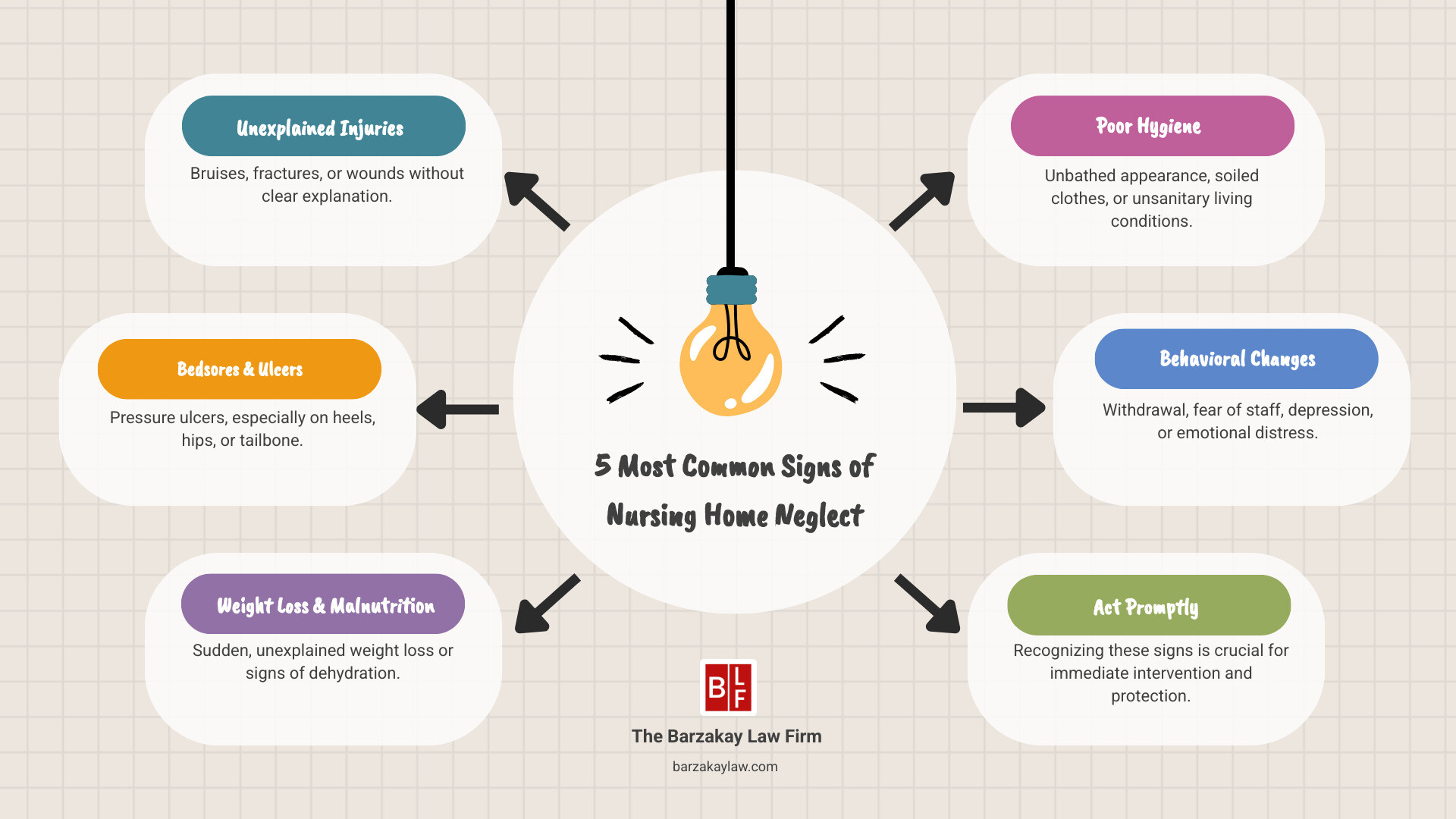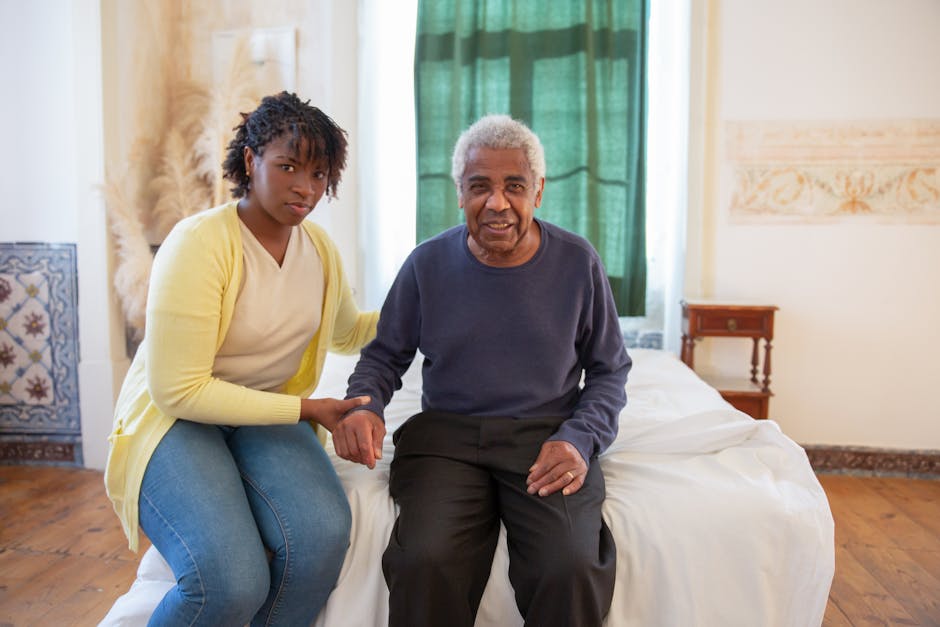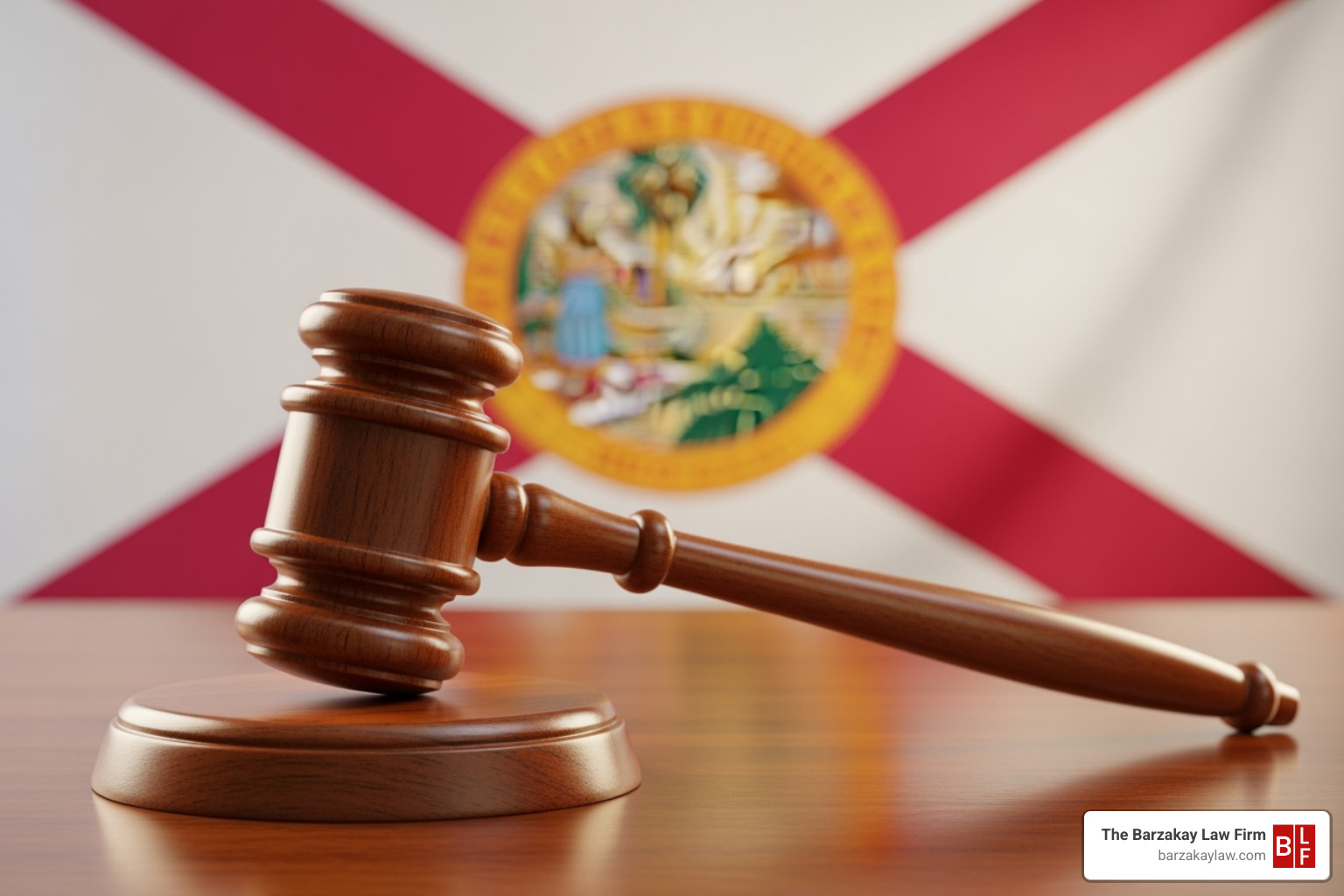Why Orlando Families Need Legal Protection When Trust Is Betrayed
Finding a nursing home abuse lawyer Orlando is critical when a trusted care facility fails your loved one. Research reveals a grim reality: 44 percent of nursing home residents reported abuse, and 95 percent have witnessed or experienced neglect.
Quick Guide to Hiring a Nursing Home Abuse Lawyer in Orlando:
- Act fast – Florida’s statute of limitations is 2 years from findy.
- Document everything – Use photos, medical records, and witness statements.
- Report abuse – Notify facility management and the Florida Department of Children and Families.
- Get a free consultation – Most lawyers work on contingency, meaning no fee unless you win.
- Know your rights – The Florida Resident Bill of Rights protects against abuse.
- Recognize the signs – Look for unexplained injuries, bedsores, malnutrition, or emotional withdrawal.
The vulnerability of residents, many of whom have cognitive impairments or fear retaliation, means they often suffer in silence. Orlando families face a heartbreaking situation when this trust is broken, compounding the emotional trauma.
This guide will walk you through the essential steps to protect your loved one’s rights and hold negligent facilities accountable. From recognizing warning signs to understanding Florida’s legal protections, you’ll learn how to steer the process of seeking justice.

Understanding Nursing Home Abuse and Neglect in Florida
When Orlando families choose a nursing home, they are placing immense trust in that facility to provide compassionate care. Unfortunately, that trust is sometimes broken. Statistics from the National Center on Elder Abuse are troubling: 44 percent of residents reported abuse, and an overwhelming 95 percent witnessed or experienced neglect.
Even more concerning is that only one in fourteen cases of elder abuse is ever reported, meaning countless seniors may be suffering in silence in Florida.

Nursing home residents are particularly vulnerable. Many have cognitive impairments or fear retaliation from staff, making it difficult to report mistreatment. Under Florida law, nursing homes have a clear duty to protect residents. When they fail, families have legal options to hold them accountable.
What Constitutes Abuse vs. Neglect?
If you’re considering contacting a nursing home abuse lawyer Orlando, it’s helpful to know the difference between abuse and neglect.
Abuse involves intentional harm, where someone deliberately hurts a resident. This is an active decision to cause suffering, such as striking or verbally threatening a resident.
Neglect is the failure to provide proper care, leading to preventable harm. This is often due to issues like understaffing or poor training, where the harm is not intentional but results from a serious breach of duty.
| Feature | Nursing Home Abuse | Nursing Home Neglect |
|---|---|---|
| Intent | Intentional act to cause harm | Failure to provide care, often unintentional (due to negligence) |
| Action | Direct action causing injury or distress | Inaction or failure to perform duties |
| Nature | Conscious harmful behavior | Lack of proper care or attention |
| Examples | Hitting, sexual assault, verbal threats, theft | Bedsores from lack of repositioning, malnutrition from inadequate feeding, untreated infections |
Both forms of mistreatment have devastating consequences. Understanding the difference helps you communicate the situation clearly to legal professionals.
Common Types of Elder Abuse
Elder abuse takes many forms, as recognized by the Administration for Community Living. Orlando families should be aware of these categories:
- Physical abuse: Any act causing bodily harm, such as hitting, pushing, or improper use of restraints. Signs include unexplained bruises, cuts, or fractures.
- Emotional and psychological abuse: This includes yelling, humiliation, threats, or isolation. It is tragically common, affecting 33.4 percent of residents, and victims often become withdrawn or fearful.
- Sexual abuse: Any unwanted sexual contact or harassment. Residents with cognitive impairments are especially vulnerable.
- Financial exploitation: Theft of a resident’s money or possessions, such as forging checks or pressuring them to change a will.
- Willful neglect: The intentional withholding of basic care like food, medication, or medical attention.
The National Council on Aging estimates that one in 10 people over 60 experience elder abuse. These are not just statistics; they are real people whose families trusted institutions to care for them.
Recognizing the Warning Signs
Since nursing homes don’t advertise their failures, families must be vigilant. Your loved one’s condition often speaks for them.
- Physical signs: Unexplained injuries like bruises, cuts, or fractures are immediate red flags. Bedsores are a particularly telling sign of neglect, as they develop when residents are not moved regularly.
- Nutritional problems: Sudden weight loss, dehydration, or signs of malnutrition may indicate a lack of adequate food and water.
- Poor hygiene: Unbathed residents, soiled clothing or bedding, and dirty rooms signal that basic care standards are not being met.
- Behavioral changes: Watch for emotional withdrawal, new fears (especially around certain staff), anxiety, or agitation.
- Financial issues: Missing personal items or unexplained financial changes could indicate theft or exploitation.
Residents with dementia or Alzheimer’s face higher risks because they may struggle to report abuse. If you notice these signs, act quickly. Document everything, contact facility management, and consider calling a nursing home abuse lawyer Orlando to understand your legal options.
Your Loved One’s Legal Rights and Grounds for a Lawsuit
Understanding your loved one’s legal rights is the first step toward holding a negligent facility accountable. Federal and state laws are in place to protect nursing home residents, and we are here to help Orlando families enforce them.

When abuse or neglect occurs, it is often a legal failure. Our firm, serving Hollywood, Miami, Boca Raton, Sunrise, Orlando, and Fort Lauderdale, is dedicated to helping families seek justice. We discuss these protections in our article on Legal Help for Elder Abuse.
Florida’s Protections for Nursing Home Residents
In Florida, residents are protected by both federal and state laws designed to ensure proper care and a life free from abuse.
The federal Nursing Home Bill of Rights (OBRA), or 42 USC § 1395i-3, requires facilities to care for residents in a way that maintains or improves their physical, mental, and psychosocial well-being.
At the state level, Florida Statutes § 429.28, the Resident Bill of Rights, reinforces these protections. It guarantees the right to live free from abuse, be treated with respect, and receive proper medical care, nutrition, and a safe, clean environment. These laws provide a strong legal framework for our clients’ cases.
Common Grounds for Filing a Claim in Orlando
A nursing home abuse or neglect case is built on specific failures by the facility or its staff. Common grounds for a claim include:
- Negligent Hiring: The facility hired staff with a history of abuse without proper background checks.
- Understaffing: Insufficient staffing prevents residents from receiving adequate care. Approximately 90 percent of nursing homes are understaffed, a major contributor to neglect.
- Inadequate Training: Staff were not properly trained in patient care, safety procedures, or handling residents with specific conditions.
- Medication Errors: Mistakes in administering medication, such as wrong doses or missed medications, that cause harm.
- Failure to Prevent Falls: The facility did not assess fall risks or implement measures to prevent falls, a common cause of serious injury.
- Breach of Statutory or Regulatory Rights: Any violation of the rights guaranteed by federal or Florida law.
- Third-Party Responsibility: Harm caused by outside contractors, such as physical therapists or dietary services.
- Resident Injuries: Any injury resulting from the facility’s negligence, including bedsores, fractures, or malnourishment.
The Legal Process with a Nursing Home Abuse Lawyer Orlando
Taking legal action against a nursing home can feel overwhelming, but you don’t have to do it alone. A nursing home abuse lawyer Orlando will guide you through each step, making the process manageable. Our team has helped many families across South Florida seek justice, and we share insights in our article on Florida Nursing Home Abuse Lawyer.

The legal process generally involves three phases designed to build a strong case.
Step 1: Immediate Actions to Take if You Suspect Abuse
If you suspect something is wrong, trust your instincts. Your first priority is your loved one’s safety, followed by preserving evidence.
- Ensure your loved one is safe. Call 911 in an emergency. Consider an examination by an independent doctor to document injuries or neglect.
- Document everything. Take photos of injuries, unsanitary conditions, or other signs of neglect. Keep a detailed journal with dates, times, incidents, and staff names.
- Report your concerns to management. This creates an official record of your complaint. Get any promises for changes in writing.
- Speak with potential witnesses. Other residents, their families, or even concerned staff may have important information.
- File official reports. Contact the Florida Department of Children and Families to report the abuse. Also, reach out to the Long-Term Care Ombudsman, an independent advocate for residents.
Step 2: Understanding the Florida Statute of Limitations
In Florida, you generally have two years to file a nursing home abuse lawsuit. However, the clock doesn’t always start when the abuse happens.
The findy rule may apply, giving you two years from when you finded the harm or reasonably should have finded it. This is important, as facilities sometimes try to hide their mistakes.
However, a statute of repose under Florida Statutes § 400.0236 creates an absolute deadline, typically four years from the incident, regardless of when you found out. For wrongful death cases, the timeline is usually two years from the date of death.
The bottom line is: don’t wait. Contacting a nursing home abuse lawyer Orlando quickly helps preserve evidence and ensures you meet all legal deadlines.
Step 3: How a Nursing Home Abuse Lawyer Orlando Can Help
Nursing home cases are complex, and facilities have lawyers protecting their interests. You deserve someone fighting just as hard for you.
- We offer a free case evaluation to discuss what happened and your legal options.
- Our investigation is thorough. We request medical records, review staffing reports, and work with medical professionals to uncover evidence.
- We handle all complex legal paperwork and ensure all court filings and deadlines are met correctly.
- We negotiate with insurance companies. They often make low settlement offers, but we know the true value of your case and will fight for fair compensation.
- We are prepared for court. If a fair settlement isn’t reached, we will present your case to a judge and jury.
- We work on a contingency fee basis. You pay no upfront costs, and we only get paid if we win your case. This ensures quality legal help is available to all families in Hollywood, Miami, Boca Raton, Sunrise, Orlando, and Fort Lauderdale.
Recoverable Damages and Choosing a Facility
When your loved one suffers from abuse or neglect, financial recovery helps manage the resulting costs, while taking steps to prevent future harm is crucial. For families in Orlando and throughout South Florida, understanding compensation options and how to choose a safer facility is essential. The goal is to hold negligent parties accountable and help families make informed decisions, using resources like Medicare’s Nursing Home Compare website.
What Compensation Can Be Recovered?
While no amount of money can undo the harm, financial recovery covers tangible costs and acknowledges the suffering involved.
- Economic damages cover measurable financial losses, such as medical expenses for treating injuries, infections, or bedsores, as well as relocation costs.
- Non-economic damages acknowledge suffering that can’t be easily calculated. This includes compensation for pain and suffering, emotional distress, and loss of enjoyment of life.
- Punitive damages may be awarded in cases of “intentional misconduct or gross negligence,” according to Florida law on punitive damages. These are intended to punish the facility and deter future misconduct.
- Wrongful death damages apply when abuse or neglect leads to a resident’s death. Families can recover end-of-life medical expenses, funeral costs, and compensation for loss of companionship and survivor’s mental anguish.
A nursing home abuse lawyer Orlando can help ensure you pursue the full compensation your family deserves.
Proactive Steps: How to Choose a Safe Nursing Home
Choosing a nursing home is a major decision. To prevent a tragedy, thorough research is key.
- Research online: Use Medicare’s Nursing Home Compare and the Florida Nursing Home Guide to check ratings, inspection reports, and complaint histories.
- Visit in person: Make unannounced visits at different times of day and on weekends. Observe the atmosphere, cleanliness, and resident engagement.
- Observe staff interactions: Watch how caregivers respond to residents. Do they seem caring and patient? Do residents appear comfortable around them?
- Ask about staffing ratios: Understaffing is a problem in about 90 percent of nursing homes. Ask about caregiver-to-resident ratios, especially for night and weekend shifts.
- Review inspection reports: Look for patterns of deficiencies related to patient care, safety, and hygiene.
- Talk to residents and families: If possible, speak with people who have direct experience with the facility for invaluable insights.
- Ask key questions: Inquire about staff turnover rates, complaint resolution processes, and training for care related to conditions like dementia.
- Trust your instincts: If something feels wrong during a visit, pay attention to that feeling.
Taking these steps can significantly reduce the risk of your loved one becoming a victim of abuse or neglect.
Frequently Asked Questions about Orlando Nursing Home Abuse Claims
When families in Orlando find nursing home abuse, they have many questions. Here are answers to the most common concerns we hear.
Who can be held liable for nursing home abuse in Florida?
Responsibility for abuse often extends beyond a single individual. We investigate every party that may have played a role. Liable parties can include:
- The nursing home facility itself, for failing to provide a safe environment.
- Individual staff members who directly abused or neglected a resident.
- Management companies that prioritize profits over patient safety, leading to issues like understaffing.
- Third-party contractors, such as dietary or therapy services, whose negligence caused harm.
- Owners and administrators who knew about problems but failed to correct them.
As your nursing home abuse lawyer Orlando, our job is to identify every responsible party to ensure full accountability.
What is the role of the Long-Term Care Ombudsman Program?
The Long-Term Care Ombudsman acts as an advocate for nursing home residents. They investigate complaints, mediate disputes between families and facilities, and work to resolve problems. The Ombudsman is an invaluable resource for understanding your rights and navigating the system. You can find more information via the Florida Ombudsman Program information.
However, the Ombudsman does not provide legal representation. To file a lawsuit and seek financial compensation, you will need a nursing home abuse lawyer Orlando to take legal action on your behalf.
How much does it cost to hire a nursing home abuse lawyer Orlando?
We believe justice should be accessible to everyone. That’s why we work on a contingency fee basis.
This means you pay no upfront costs. We handle all expenses related to investigating and building your case. Our fee is a percentage of the compensation we recover for you, whether through a settlement or a court verdict.
If we don’t win your case, you owe us nothing for our legal services. This allows families in Hollywood, Miami, Boca Raton, Sunrise, Orlando, and Fort Lauderdale to seek justice without financial risk.
Conclusion: Taking the Next Step to Protect Your Loved One
Summary of key steps – You now know how to recognize the warning signs of abuse, understand your loved one’s legal rights in Florida, and what immediate actions to take. While the path forward may seem difficult, you are not alone.
Importance of accountability is paramount. Holding negligent facilities accountable provides justice for your family and helps prevent similar tragedies from happening to others. Every successful case sends a message that abuse and neglect will not be tolerated in Florida.
Seeking justice for your family is about more than money; it’s about ensuring your voice is heard and that the facility faces consequences for its failures.
At The Barzakay Law Firm, we stand up for families in Orlando, Hollywood, Miami, Boca Raton, Sunrise, Fort Lauderdale, and throughout South Florida.
Our contingency fee representation means you pay no attorney fees unless we win your case. We handle the legal complexities so you can focus on your loved one’s well-being.
Time is critical. Florida’s statute of limitations can bar your claim if you wait too long. If you suspect your loved one has suffered from abuse or neglect, don’t delay.
Contact us for a free and confidential case evaluation today. We will listen to your story and help you understand your options. Your loved one deserves dignity and safety. When that trust is broken, we are here to help you fight back.
